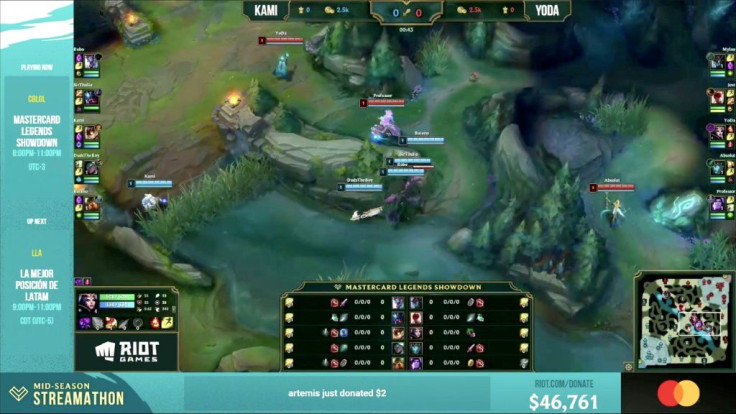Riot Games CEO Faces Sexual Harassment Allegations
League of Legends maker Riot Games said Wednesday it had hired an independent team to review allegations of sexual harassment against its top executive, in the latest episode highlighting a troubled workplace culture in the video game industry.
Riot chief executive Nicolas Laurent is accused in a California lawsuit of retaliating against his assistant, Sharon O'Donnell, after she refused what she took as an invitation for a sexual liaison.
"Female employees are discriminated against, harassed and treated as second class citizens," contended the suit filed against Laurent and Riot last month in Los Angeles, where the company is based.
Riot told AFP that its board of directors is overseeing an investigation of the matter by an outside law firm, and Laurent has pledged to cooperate.
"Over the past several years, workplace culture has been one of our top priorities and we're proud of the steps we've taken to make Riot Games a great place to work," the company said in response to an AFP inquiry.
"Core to giving Rioters confidence in our commitment to culture transformation is taking all allegations of harassment or discrimination very seriously, thoroughly investigating claims, and taking action against anyone who is found to have violated our policies."
O'Donnell contended in the suit that she faced sexual harassment and a hostile work environment after being hired as Laurent's executive assistant in October of 2017.
Claims in the legal filing include Laurent saying that his wife was jealous of beautiful women and that he talked about his underwear size.
Laurent, who is French, purportedly asked O'Donnell if she could handle him if they were alone together, and invited her to join him at his home while his family was away, according to the suit.
O'Donnell said in the filing that job duties were taken away from her and she was eventually fired last year after rejecting what she saw as sexual advances by Laurent.
Riot countered that O'Donnell was terminated from her job after more than a dozen complaints by work colleagues and outside partners, and "any suggestion otherwise is simply false."

Riot has previously been hit with accusations of sexual discrimination, with scores of workers staging a walk-out two years ago to protest the company's practice of compelling such complaints to be handled in arbitration instead of public courts.
A slew of gender discrimination cases are currently in play against Riot, with some referred to arbitration and California state agencies are aiming for trial in others, the company confirmed.
The incident is the latest highlighting a troubled workplace in the industry and follows a review launched last year by Ubisoft, one of the world's largest video game companies, into claims of sexual assault and harassment levelled against some of its employees.
Sexist behavior, discrimination, complaints that go ignored: employees at Ubisoft Montreal, which bills itself as the world's largest gaming studio, last year described a "climate of terror" at the French group firm.
Ubisoft CEO Yves Guillemot promised "major changes in corporate culture."
The video game industry along with the world of players has been struggling for years to shake off its "boys only" image and better reflect the demographics of its exploding ranks of players.
An ugly saga in 2014 referred to as "GamerGate" involving online harassment evolved into a fierce debate regarding sexism and racism in video games and the male-dominated industry that makes them.
While video games may be thought of as toys for boys, ranks of women players have been steadily growing with the popularity of "casual" games on mobile devices and the lure of prize money in eSports matches.
"The rise of female gamers has been rapid in recent years," industry tracker Statista said in a recent post, estimating that 46 percent of video game players in 2019 were female.
gc/rl
© Copyright AFP 2024. All rights reserved.





















